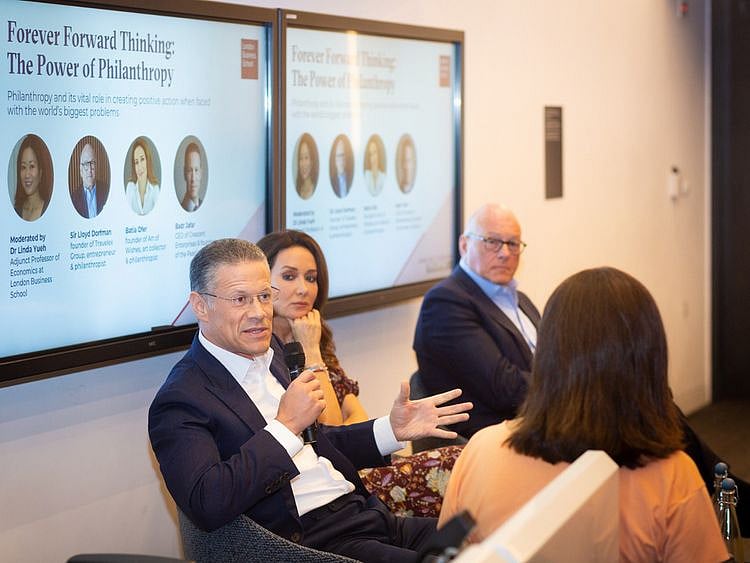Less than 2% of philanthropic giving globally is directed towards climate action
London Business School focuses on how philanthropy can tackle environmental challenges

London Business School (LBS) hosted a plenary symposium exploring the theme, Forever Forward Thinking: The Power of Philanthropy. The event brought together prominent philanthropic leaders from different regions of the world to examine the pivotal role of philanthropy in tackling pressing global challenges.
The plenary discussion, introduced by François Ortalo-Magné, Dean of LBS,hosted Badr Jafar, CEO of Crescent Enterprises and COP28 Special Representative for Business & Philanthropy; Batia Ofer, founder of Art of Wishes; and Sir Lloyd Dorfman CVO CBE, founder of Travelex Group. The discussion delved into the different practices of philanthropy around the world, and its evolving significance as a form of catalytic capital to scale solutions in the face of global issues such as climate change.
Badr Jafar shared practical perspectives on philanthropy, tracing its evolution from traditional charity to a more strategic and impact-focused approach. He commented, “The key distinction between charity and philanthropy lies in viewing strategic philanthropy as an impact-driven, result-focused form of giving. It is rooted in disciplined planning and execution, with diligent follow through to achieve desired outcomes.”
The conversation extended to the role of businesses and philanthropy in addressing societal and environmental challenges. Jafar, who has been appointed as COP28 Special Representative for Business and Philanthropy, added, “Businesses need to see themselves as the real agents of positive change. With the latest paradigm shift taking place around the role of business, they are now are fully expected to be positive change agents for social and environmental causes.”
On philanthropy’s role in tackling environmental challenges, Badr Jafar spoke of its integral role in catalysing climate action both globally, with less than 2 per cent of philanthropic funding globally currently directed towards climate causes. “Private philanthropy stands at well over $1 trillion annually, which is more than five times official development assistance from governments. Strategic philanthropy has the ability to deploy flexible, risk-tolerant, and patient capital in ways that uniquely leverage business and government capital and create that multiplier effect.”
He continued: “With projections of $4 trillion to $9 trillion per year required to support net zero and nature positive goals, COP28 in the UAE will raise the bar in terms of ambition and the creation of a global architecture for all capital actors to act together at speed and at scale.”
Looking ahead, the panel discussed emerging trends in philanthropy, including the anticipated intergenerational wealth transfer and technology's influence on reshaping philanthropic engagement. “Over the next 15 years, $68 trillion is expected to be passed down to the next generation globally, making it the largest intergenerational wealth transfer in history. With the growth of digital platforms, we are seeing a shift from a one-to-many model of philanthropy, to a many-to-one’ model, where entities seeking help can source smaller donations from an infinite pool of retail donors,” said Jafar.
The panel also discussed the rise of collaboration among philanthropists, who are co-investing resources to achieve common goals.
Sign up for the Daily Briefing
Get the latest news and updates straight to your inbox
Network Links
GN StoreDownload our app
© Al Nisr Publishing LLC 2025. All rights reserved.